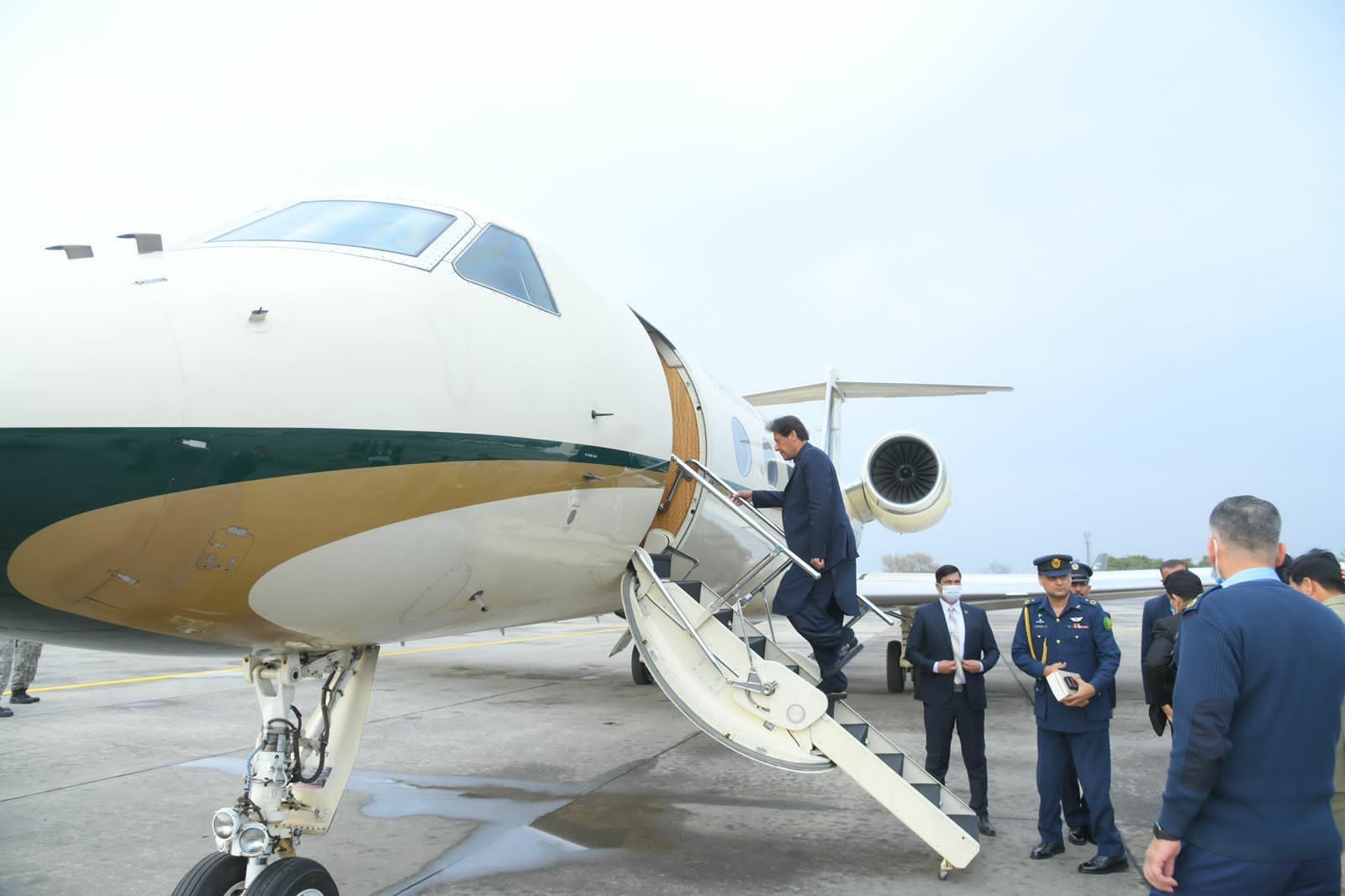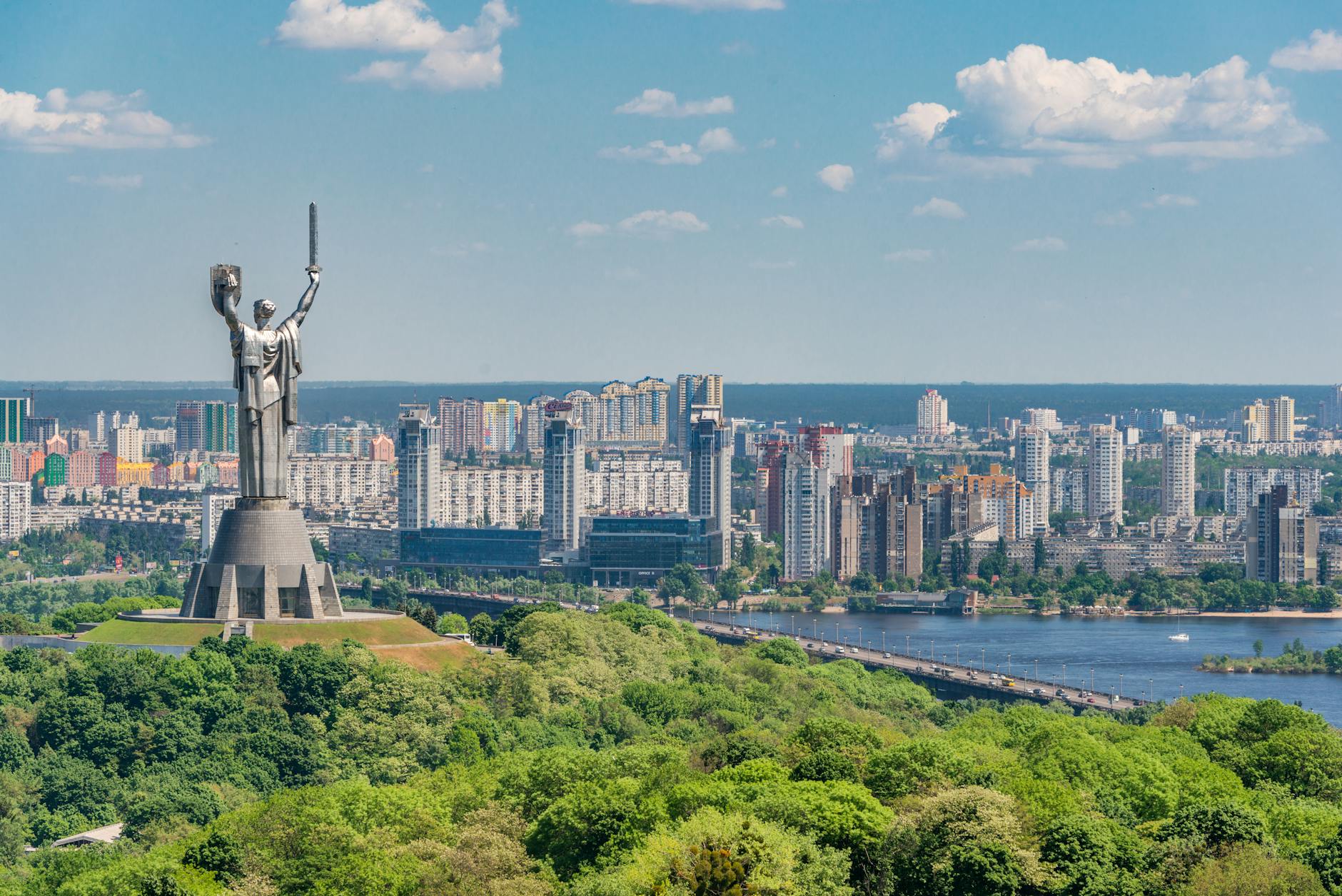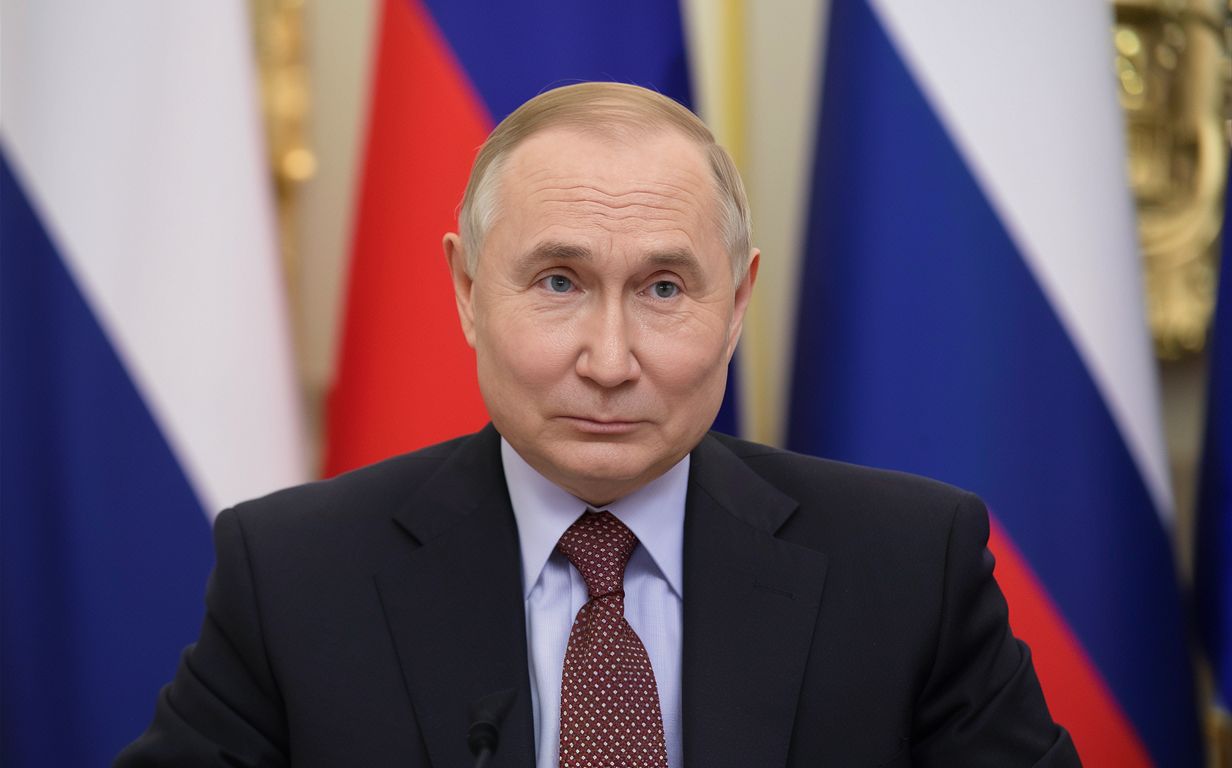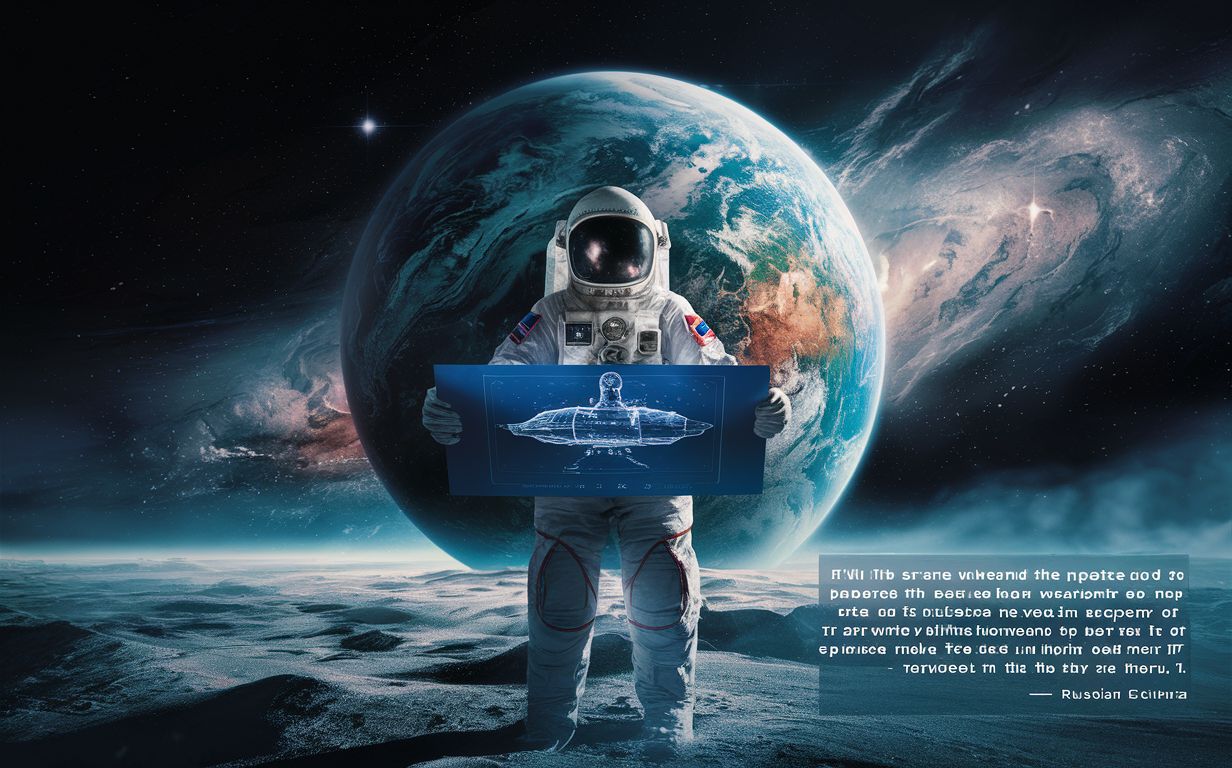Russia
PM Imran departs for two-day ‘historic’ visit to Russia amid Ukraine Crisis

Premier to meet Russian President Vladimir Putin among other officials, Agenda includes pushing for construction of long-delayed, multi-billion-dollar gas pipeline
Prime Minister Imran Khan departed on Wednesday for a two-day visit to Russia during which he will hold bilateral meetings with President Vladimir Putin and other officials. A delegation of ministers is also accompanying the premier.
Pakistan Tehreek-e-Insaf (PTI) Senator Faisal Javed Khan called the visit historic and a game-changer. “This is historic as it’s the first visit to Russia by any Pakistani Prime Minister in 23 years. Khan-Putin meeting is scheduled for Thursday,” the senator stated in a Twitter post.
“Wide-ranging exchange of views on major regional and international issues, including Islamophobia and the situation in Afghanistan will be discussed during PM Imran’s meeting with President Putin.
During the visit, PM Imran is also expected to push for the construction of a long-delayed, multi-billion-dollar gas pipeline to be built in collaboration with Russian companies.
Khan’s trip to meet President Vladimir Putin and discuss issues including economic cooperation comes hours after a number of Western nations hit Russia with new sanctions for its military deployment into parts of eastern Ukraine.
It is pertinent to mention here that PM Imran’s two-day visit was planned before the current crisis over Ukraine.
“Both countries are eager to launch the project at the earliest,” Pakistan’s energy ministry spokesman told Reuters about the Pakistan Stream gas pipeline.
The 1,100 km (683 miles)-long pipeline, also known as the North-South gas pipeline, was initially agreed to in 2015 and was to be financed by both Moscow and Islamabad, using a Russian company to construct it.
It is unclear how the latest sanctions will affect the project, which would deliver imported Liquified Natural Gas (LNG) from Karachi on the Arabian Sea coast to power plants in the northeastern province of Punjab.
The project is important for Pakistan – particularly the power sector – as the country’s dependence on imported LNG grows in the face of dwindling indigenous gas supplies.
The pipeline project has already suffered delays because of earlier sanctions.
In an interview ahead of his trip, Khan had expressed concern about the situation in Ukraine and the possibility of new sanctions and their effect on Islamabad’s budding cooperation with Moscow.
Relations between Pakistan and Russia were minimal for years as Islamabad sided with the United States in the Cold War and was given Major Non-NATO Ally status by Washington after US forces invaded Afghanistan in 2001.
In recent years, however, relations between the United States and Pakistan have deteriorated and there has been thawing between Moscow and Islamabad, which has seen the planning of projects in the gas and energy fields.
In an interview published on Monday, Khan played down the timing of the visit, and any effect it would have on Pakistan’s relations with the West.
“This visit was planned well before the emergence of the current phase of Ukrainian crisis … I received the invitation from President Putin much earlier,” he told Newsweek Pakistan.
Last week, Federal Minister for Information and Broadcasting Fawad Chaudhry termed Prime Minister Imran Khan’s visit to Russia a “game-changer” for bilateral relations of the two countries.
“It will be a great and game-changer visit, and by the grace of Allah, the Almighty, now after China, Pakistan’s relations with Russia are going to get further strengthened,” he said while addressing media.
Discover more from The Monitor
Subscribe to get the latest posts sent to your email.
Ukraine
The Future of Ukraine after the Russian Invasion: The Implications of War and the Way Forwardcible

The Russian invasion of Ukraine is not just a conflict of borders; it is a civilisational crucible. For decades, Ukraine grappled with a fragmented identity, pulled between East and West, its sovereignty a prize, not a certainty. The full-scale invasion of 2022 violently shattered that ambiguity, forging a nation defined by its resistance and an unyielding commitment to European democracy. The future of Ukraine will not be a return to the past, but a radical national reset, born from the ashes of war and built on the iron foundation of an irreversible, Western-aligned choice. This is the moment when unity must transmute into radical, irreversible reform, for the war’s end will only mark the beginning of Ukraine’s most profound and challenging battle: the fight for a prosperous, sovereign, and truly European soul.
Table of Contents
💔 The Enduring Cost and Geopolitical Rebirth
The human cost of this war defies the cold comfort of statistics. Beyond the tragic tally of lives lost and the millions displaced—a long-term demographic hole that will haunt the nation for generations—lies a profound, collective psychological wound. The national psyche is steeped in trauma, from the pervasive anxiety of constant shelling to the moral injury suffered by combatants and the grief of families. . Reintegrating millions of veterans, many with physical and “invisible wounds” like PTSD, alongside internally displaced persons (IDPs) and refugees, will be a decades-long task, stretching the capacity of an already-strained social and healthcare system. Current reintegration efforts, often fragmented and over-reliant on outdated benefit systems, must evolve into a comprehensive, trauma-informed “opportunity policy” that supports both the individual and their family, seeing veterans not as recipients of aid, but as national assets.
This existential threat has, paradoxically, clarified Ukraine’s geopolitical destiny. The unprovoked aggression has hardened the nation’s resolve, permanently sealing its “civilizational choice.” Any lingering doubt about whether Ukraine belongs to the Russian “sphere of influence” has been obliterated. The war has become the most powerful accelerator of the Euro-Atlantic integration project since the fall of the Berlin Wall. The path toward EU accession—now cemented as a constitutional goal—is complicated by the war’s instability and the vast scope of required legislative alignment. Yet, the process is an essential anchor for future stability and reform. Crucially, a post-war Ukraine cannot exist without strong, legally binding security guarantees. The non-binding promises of the 1994 Budapest Memorandum are a scar on the national memory. Ukraine needs a robust defense architecture—whether through full NATO membership once conditions allow, or an immediate, binding security treaty modeled on the US-Japan relationship—to deter future aggression and safeguard the billions in reconstruction investment. The only reliable guarantee is a permanent, technologically advanced self-defense capability backed by committed international partners.
🏗️ The Herculean Task of Economic Reconstruction
The task of rebuilding Ukraine is a financial and logistical challenge that invokes the scale of the post-WWII Marshall Plan, yet it faces a modern paradox. Current estimates for reconstruction stand in the hundreds of billions of Euros, a figure that is constantly rising. The complexity lies not just in the colossal sums, but in the intricate choreography of international funding. Mechanisms like the EU’s Ukraine Facility must be coordinated with capital derived from the frozen Russian assets. The legal and financial architecture for using these $200+ billion sovereign funds—potentially via a “reparations loan” backed by the interest generated—is a necessary, moral, and strategically essential mechanism to make the aggressor pay for the destruction, securing predictable, long-term financing that private investors require.
This destruction, however, offers a unique, tragic opportunity to “Build Back Better & Greener.” Instead of restoring obsolete Soviet-era infrastructure, Ukraine can leapfrog outdated technology. The focus must be on a green transition, prioritizing decentralized, resilient energy grids powered by renewables like solar and wind, especially given the vulnerability of centralized fossil-fuel power plants. This transition, alongside a strategic investment in the high-tech, IT, and defense sectors—where Ukraine already demonstrates world-class innovation—is the blueprint for attracting the massive private foreign investment necessary for long-term growth. Investment must move beyond mere charity and into genuine, mutually beneficial enterprise.
However, the greatest internal threat to this ambitious future is not Russian missiles but deep-seated corruption and the entrenched power of the oligarchy. Western aid and the prospect of EU membership hinge entirely on demonstrable, irreversible progress in de-oligarchisation. The war has, to some extent, financially weakened some oligarchs, but their corrosive political influence remains a structural challenge. The Anti-Corruption Litmus Test requires the full, independent operationalisation of anti-corruption agencies (NABU, SAPO, and the High Anti-Corruption Court) and the consistent, uncompromising application of the Anti-Oligarch Law. Failure to fundamentally dismantle these patronage networks would not only choke off the flow of reconstruction funds but would betray the sacrifices made on the battlefield. . Ukraine must prove its commitment to the rule of law not only for Brussels but for its own people, who deserve an economy built on competition and merit, not connections.
🧭 The Way Forward: Sovereignty, Security, and Scrutiny
The final architecture of Ukraine’s future must be built upon three pillars: sovereignty, Security, and Scrutiny.
The foundation of security architecture must be a long-term deterrent. Beyond whatever non-NATO security agreements are forged with G7 allies, Ukraine must maintain a technologically superior, permanently ready military, integrated into Western defense planning and supplied by a robust, indigenous defense industry. This is the ultimate self-guarantee.
The second pillar, Sovereignty, demands a profound Democratic Deepening. Strengthening democratic institutions and the rule of law in the shadow of war is uniquely difficult. The national unity forged in wartime must not be used as an excuse to centralize power or suppress legitimate political opposition and internal debate. The challenge is managing political rivalries while upholding the independence of the media—ensuring it is not recaptured by oligarchic interests—and delivering justice reform that is felt by the average citizen.
The final pillar is Scrutiny. Ukraine must embrace maximum transparency and accountability in its reconstruction, understanding that every Euro and dollar spent is a sacred trust. This scrutiny must come from its Western partners, its vibrant civil society, and its independent press.
The extraordinary national unity forged in war is a powerful, inspiring force. It demonstrated an unbreakable will to defend the nation’s independence. The Final Choice for Ukraine’s political class is whether that profound will can be translated into the excruciatingly difficult, often unpopular, but necessary political will to execute the radical reforms required for true European integration and a prosperous future. Will they choose the path of the Phoenix—a radical, meritocratic rebirth—or will they succumb to the weight of reconstruction and the insidious return of entrenched corruption? The world has committed to helping Ukraine win the war. Ukraine must now commit to winning the peace, by building a state that is not only whole but just and worthy of the sacrifice made. Failure to do so would be the final, most tragic victory for the aggressor.
Discover more from The Monitor
Subscribe to get the latest posts sent to your email.
Analysis
The Global Impact of Vladimir Putin’s 2024 Election Victory: A Deep Dive into Russia’s Future Role on the World Stage

Introduction
The recent 2024 Russian elections saw Vladimir Putin secure another term as President, marking his fourth consecutive term in office. This victory has sparked a wave of speculation and analysis about what it means for both Russia and the international community. Putin’s win is likely to have significant implications, particularly on a global scale.
Some analysts believe that Putin’s continued leadership will result in an even more assertive foreign policy, while others argue that it could lead to increased tensions with the West. It remains to be seen how Putin’s victory will shape the political landscape in Russia and beyond, but it will have far-reaching consequences.

Table of Contents
Putin’s Continued Leadership
With Vladimir Putin’s re-election as the President of Russia, the country is set to maintain its current trajectory under his leadership. This continuity brings both stability and predictability to Russian domestic and foreign policies, influencing how the country engages with the world. Putin’s re-election also signals the continuation of his assertive foreign policy, which has been marked by increased tensions with the West. However, this predictability could also provide opportunities for international cooperation with Russia on issues such as regional security and counter-terrorism efforts.
Geopolitical Dynamics
The victory of Vladimir Putin in the presidential elections has far-reaching implications for global geopolitics. Russia’s assertive foreign policy, especially in regions like Eastern Europe and the Middle East, is likely to persist. This could lead to potential changes in existing power dynamics and international relations, leading to shifts in alliances and conflicts. It remains to be seen how other countries will respond to this shift, and whether it will have a significant impact on the balance of power in the world.
Economic Considerations
The Russian economy is known for its close ties to political stability. With Putin’s recent win, many investors and businesses operating in or with Russia may feel a sense of continuity. However, it’s important to keep an eye on certain factors such as economic diversification, sanctions, and energy dependence. These concerns will likely continue to play a significant role in shaping the future of the Russian economy in the coming years.
International Relations
The recent re-election of Vladimir Putin as the President of Russia is expected to have a significant impact on the country’s relationships with other nations. The West, in particular, will need to carefully navigate its interactions with Russia led by Putin for an extended period. This could have implications for several important issues, including arms control, cybersecurity, and regional conflicts. As such, we will likely continue to see a great deal of attention paid to Russia and its foreign policy decisions in the years ahead.
Human Rights and Democracy
Critics have raised concerns about human rights abuses and democratic backsliding under Putin’s rule. His victory may further embolden authoritarian tendencies within Russia and set a precedent for similar actions in other parts of the world.
Global Security
Russia plays a crucial role in global security issues such as nuclear proliferation, counterterrorism, and cybersecurity. Putin’s continued leadership will influence how these challenges are addressed on the international stage.
Conclusion
The victory of Vladimir Putin in the 2024 Russian elections carries far-reaching implications for global politics, economics, and security. As we look ahead, understanding these implications will be crucial for policymakers, analysts, and citizens around the world to navigate the evolving landscape shaped by Russia’s continued presence under Putin’s leadership.
Discover more from The Monitor
Subscribe to get the latest posts sent to your email.
Analysis
Unveiling Russia’s Space Ambitions: The Growing Debate on Placing Nuclear Weapons Beyond Earth

Introduction
In the realm of international relations and military strategy, the idea of placing nuclear weapons in space has resurfaced, raising concerns and sparking debates. This article delves into the motivations behind Russia’s potential interest in deploying nuclear weapons in space, exploring the historical context, technological advancements, and strategic implications of such a controversial move.

Historical Context:
To understand the current discourse surrounding the placement of nuclear weapons in space, it is crucial to revisit the historical backdrop that has shaped this concept. The Cold War era witnessed intense competition between the United States and the Soviet Union, culminating in the Outer Space Treaty of 1967, which prohibited the placement of nuclear weapons in space. However, recent developments suggest a potential shift in this paradigm.
Technological Advancements:
Advancements in space technology have opened up new possibilities for military applications beyond Earth’s atmosphere. Russia’s investments in space-based capabilities, including anti-satellite weapons and manoeuvrable satellites, indicate a growing interest in enhancing its strategic capabilities in space. The integration of nuclear weapons into this framework presents a formidable challenge to existing norms and security paradigms.
Strategic Implications:
The prospect of placing nuclear weapons in space carries significant strategic implications for global security and stability. By leveraging space-based assets for offensive purposes, Russia could potentially gain a decisive advantage in future conflicts, complicating deterrence strategies and escalating tensions among major powers. The militarization of space poses a direct threat to existing arms control agreements and raises concerns about the weaponization of outer space.
Motivations Behind Russia’s Strategy:
Several factors may drive Russia’s consideration of placing nuclear weapons in space. From a strategic perspective, it could serve as a deterrent against perceived threats from rival powers and reinforce Russia’s position as a major player in the space domain. Moreover, by showcasing its technological prowess and military capabilities in space, Russia aims to assert its influence on the global stage and shape the future trajectory of space governance.
International Response and Diplomatic Challenges:
The potential deployment of nuclear weapons in space by Russia is likely to provoke strong reactions from the international community, particularly from countries with vested interests in maintaining outer space as a peaceful domain. Diplomatic efforts to address this issue will require multilateral cooperation and dialogue to prevent an arms race in space and uphold existing treaties that regulate activities beyond Earth’s atmosphere.
Conclusion:
As we navigate the complexities of an evolving geopolitical landscape, the question of placing nuclear weapons in space underscores the need for proactive engagement and strategic foresight. By examining the historical context, technological advancements, strategic implications, motivations behind Russia’s strategy, international response, and diplomatic challenges associated with this issue, we can better comprehend the nuances of contemporary security dynamics in outer space.
Discover more from The Monitor
Subscribe to get the latest posts sent to your email.
-

 Featured5 years ago
Featured5 years agoThe Right-Wing Politics in United States & The Capitol Hill Mayhem
-

 News4 years ago
News4 years agoPrioritizing health & education most effective way to improve socio-economic status: President
-

 China5 years ago
China5 years agoCoronavirus Pandemic and Global Response
-

 Canada5 years ago
Canada5 years agoSocio-Economic Implications of Canadian Border Closure With U.S
-

 Democracy5 years ago
Democracy5 years agoMissing You! SPSC
-

 Conflict5 years ago
Conflict5 years agoKashmir Lockdown, UNGA & Thereafter
-

 Democracy5 years ago
Democracy5 years agoPresident Dr Arif Alvi Confers Civil Awards on Independence Day
-

 Digital5 years ago
Digital5 years agoPakistan Moves Closer to Train One Million Youth with Digital Skills
















